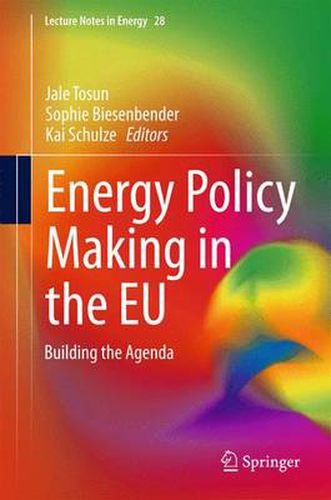Readings Newsletter
Become a Readings Member to make your shopping experience even easier.
Sign in or sign up for free!
You’re not far away from qualifying for FREE standard shipping within Australia
You’ve qualified for FREE standard shipping within Australia
The cart is loading…






This title is printed to order. This book may have been self-published. If so, we cannot guarantee the quality of the content. In the main most books will have gone through the editing process however some may not. We therefore suggest that you be aware of this before ordering this book. If in doubt check either the author or publisher’s details as we are unable to accept any returns unless they are faulty. Please contact us if you have any questions.
The book adopts an innovative analytical approach to agenda setting by not only presenting successful cases in which energy issues were addressed by means of public policy, but by also analyzing failed attempts to make issues part of the European policy agenda. Another outstanding feature of the book is its use of the latest empirical data on a broad range of energy issues.
When are energy issues likely to find their way to the agenda of European policymakers? This is the key research question guiding this collection of empirical studies, which will shed light on both successful and unsuccessful attempts to include energy issues in the European agenda. The multi-level political system of the European Union represents a particularly fruitful setting for addressing this question due to the multiple institutional access points it provides for different groups of actors. The book has three key benefits. First, it provides a theory-informed analysis of agenda setting processes in general and in the European Union in particular. Second, it presents an overview of the most important and emerging dimensions on European energy policy, and third, it helps to develop a research agenda for future research in the field.
$9.00 standard shipping within Australia
FREE standard shipping within Australia for orders over $100.00
Express & International shipping calculated at checkout
This title is printed to order. This book may have been self-published. If so, we cannot guarantee the quality of the content. In the main most books will have gone through the editing process however some may not. We therefore suggest that you be aware of this before ordering this book. If in doubt check either the author or publisher’s details as we are unable to accept any returns unless they are faulty. Please contact us if you have any questions.
The book adopts an innovative analytical approach to agenda setting by not only presenting successful cases in which energy issues were addressed by means of public policy, but by also analyzing failed attempts to make issues part of the European policy agenda. Another outstanding feature of the book is its use of the latest empirical data on a broad range of energy issues.
When are energy issues likely to find their way to the agenda of European policymakers? This is the key research question guiding this collection of empirical studies, which will shed light on both successful and unsuccessful attempts to include energy issues in the European agenda. The multi-level political system of the European Union represents a particularly fruitful setting for addressing this question due to the multiple institutional access points it provides for different groups of actors. The book has three key benefits. First, it provides a theory-informed analysis of agenda setting processes in general and in the European Union in particular. Second, it presents an overview of the most important and emerging dimensions on European energy policy, and third, it helps to develop a research agenda for future research in the field.